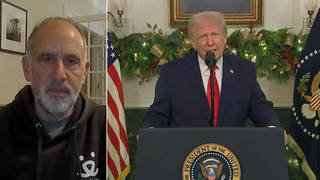
Sunday marked the start of the Rainbow/Push coalition’s economic summit in New York City. We speak with the group’s founder, the Reverend Jesse Jackson, about Supreme Court nominee Samuel Alito, the government response to Hurricane Katrina, Ariel Sharon and more. [includes rush transcript]
Sunday marked the start of the Rainbow/Push coalition’s economic summit in New York City. The four-day summit, called the Wall Street Project, has brought together African-American business executives, politicians, ministers, labor and civil rights leaders from around the country. Each day a different issue will be addressed including, increasing minority access to capital, minority participation in pension plans and building the church as a community development organization.
The opening day of the summit was focused on the Hurricane Katrina disaster. The theme was “Rebuilding After Katrina: The Right to Relocation, Reconstruction and Return. We caught up with the founder and president of the Rainbow Push Coalition, Reverend Jesse Jackson. He talked to us about a few topics including his thoughts on Supreme Court nominee, Samuel Alito.
- Rev. Jesse Jackson, founder of the Rainbow/PUSH Coalition.
Transcript
AMY GOODMAN: After the meeting, I spoke with Reverend Jesse Jackson, among other issues, about the confirmation hearings for Samuel Alito.
REV. JESSE JACKSON: It is another state’s rights judge who does not embrace the more perfect union or the broader view of America. And state’s rights offer severe limitations to civil rights, workers’ rights and women’s rights. I think that liberals often make a big mistake. They try to judge one, issue by issue. Where does one fundamentally stand on the union versus state’s rights, the union versus the confederacy. And the George Bush ideology is a state’s rights ideology. And if, in fact, they had prevailed, we wouldn’t have the 54th Supreme Court decision, if they, in fact, had prevailed, but they manifest themselves again, and I think Alito represents real danger for our rights.
AMY GOODMAN: I mean, you don’t agree with President Bush, but he has the right to choose the Supreme Court justice. Of course, they have to be confirmed by the Senate.
REV. JESSE JACKSON: He has the right to recommend. We have the right to resist. His recommendations are not in our interest, and therefore, we must resist his recommendations. He does not have the right to appoint unilaterally by fiat. And we would be ridiculously stupid not to resist that which is not in our interest.
AMY GOODMAN: Domestic spying, your response with Dr. King when he died, a well-known victim of domestic spying?
REV. JESSE JACKSON: Well, and so am I and so are many of us. We have gone from being lied to about the war to being spied on for protesting the war. It is unconstitutional. There was no constitutional protection. It’s how you create an enemies list. Last year, those who disagreed with the Bush campaign were on the enemies list for I.R.S. investigations, many churches and civil rights organizations. Now it’s an enemies list. In fact, you might be talking to the enemy. This is an impeachable offense, and the Congress must not spare the integrity of our country in having hearings on just how much violence he did to the law in this act, this unauthorized unconstitutional act.
AMY GOODMAN: You said you were a victim of domestic surveillance?
REV. JESSE JACKSON: Oh, indeed, our organizations — or I was a part of Dr. King’s organization. Our staffers — our wires were tapped. We were followed. In the risk, one in Chicago, our names came out on the list. My name came out on a list. And so, there is no doubt that they’re having an enemies list of those who protest. Our organization, our NAA churches last year that protested the Bush campaign, faced an I.R.S. investigation, so it’s not right, but it’s not new.
AMY GOODMAN: Your response, Reverend Jackson, to Reverend Robertson’s characterization of Ariel Sharon and why he lies gravely ill?
REV. JESSE JACKSON: His position was un-theological and inappropriate. I’m amazed not just that he said what he said, but the tepid response by the White House and the silence by the White evangelicals who, in fact, seem to disagree with Mr. Robertson’s being impolite, but they’re not challenging him theologically. Sharon’s position of land for peace is morally correct and practically sound. Furthermore, Israel is holy ground, but the fact is the earth is the Lord’s in the fullness. The whole earth is holy. We must fight for peace everywhere.
And to that extent, his position is the same kind of view you see people through a keyhole and not through a door. That kind of theology rationalized slavery as God’s will, that we Blacks are the cursed descendants of Ham. The same theology resisted fighting Hitler. At least he was a Christian. That same theology resisted supporting Dr. King to change the laws of the South, resisted supporting Nelson Mandela. It is a consistent ideological line. It is wrong, and I am dismayed at how little response there has been. And I hope that Mr. Sharon’s health will be restored, but I reject the idea that somehow he got sick at 78 with a stroke because God intervened and struck him down to punish him. That’s perverse.
AMY GOODMAN: The White House’s criticism of Robertson’s comments?
REV. JESSE JACKSON: Tepid, at best. The White House was inappropriate. They did not — because [inaudible] Pat Robertson represents President Bush’s base. The extreme right wing is his political base. And he said enough to say, 'I said something,' not enough to reject the very idea. I mean, theologically and philosophically and morally, what Pat Robertson said is wrong and impractical.
AMY GOODMAN: Finally, we’re here at a Midtown New York hotel for the beginning of your three-day conference, the Wall Street Project, where you’ve begun by talking about what has happened to New Orleans after Katrina.
REV. JESSE JACKSON: We’re looking at the expanding face of American poverty. Katrina has become a metaphor for poverty. But poverty is Sago land mine disaster. Poverty is the gutted urban areas, the abandoned rural areas. Poverty is the result of bills that would cut Medicaid, cut Medicare, cut college grants and increase tax breaks for the wealthy and spend $8 billion a month in Iraq, the result of foolish spending and misplaced priorities. We focus on Katrina, which really is New Orleans, Mississippi, and Alabama as a zone, while demanding a strategy for reinvestment, demanding the high and best use of pension funds as a source of capital to invest on long-term more interest basis that the survivors might, in fact, have the right to go home and rebuild their lives and their homes.
AMY GOODMAN: And what about the support that the people of New Orleans in diaspora have gotten?
REV. JESSE JACKSON: Well, it has been sparse, in the sense that people were sent to places without a certain destination. They’re now in exile and can’t get back home. They don’t have good solid information. Many of them long for home again. They don’t know whether this environment is safe. If they can go back, is there a place to stay? Are their homes being razed? Are they going to take away their property and give them 60% on their loans. 87% of the people who applied for loans didn’t qualify, because poor people need long-term low interest loans, not conventional loans. And so, at this point [inaudible] there was no real mass plan for rescue, nor for mass relocation. There is no plan for mass return and mass reconstruction. And what the Rainbow intends to do — we’ve established an office in New Orleans — is to mobilize a vast coalition of people, so we can coordinate activities. Many people want to help, Amy, in some way, and they’re not philosophically divided; they are, in fact, disconnected. So we’re building a strong Katrina reconstruction, right to return home website so we can begin to connect the dots and people with resources who really care.
AMY GOODMAN: The Reverend Jesse Jackson.













Media Options